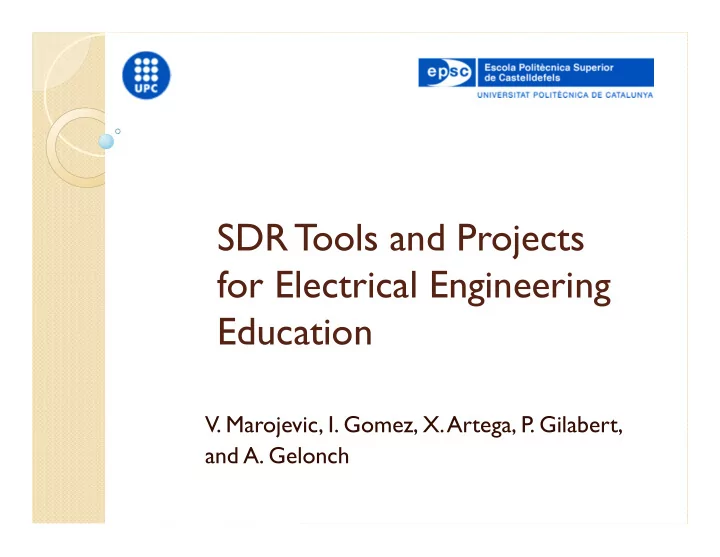

SDR Tools and Projects for Electrical Engineering Education V. Marojevic, I. Gomez, X. Artega, P. Gilabert, and A. Gelonch
Contents Introduction SDR Framework ALOE SDR Educational T ools Student Projects Lessons Learned 2
Context Software-defined radio (SDR) unifies radio engineering to computer science issues SDR adds additional difficulties to common wireless communications practices Software design and portability are important in SDR research and development 3
University Education Universities provide theoretical background Teach practical engineering tools beyond simulation environments Prepare students for their profession or grad school School of Telecommunications and Aerospace Engineering (EETAC) Project based learning (PBL) Technical and scientific courses in Telecommunication and Aerospace Science and Technology (BSc, MSc, PhD) 4
Our Contribution Flexible wireless communications systems and networks (FlexNets) project Abstraction layer and operating environment (ALOE) + a set of research and educational tools Framework and tools continuously evolving for and with our students Available for free download from: http://flexnets.upc.edu/trac/ 5
6
SDR Framework ALOE (Abstraction Layer and Operating Environment) 7
Features real-time execution waveform execution control synchronized distributed computing packet-oriented data flows cognitive computing resource management external configuration and management I. Gomez, V. Marojevic, A. Gelonch, “ALOE: an open-source SDR execution environment with cognitive computing resource management 8 capabilities,” IEEE Commun. Mag. , vol. 49, iss. 9, pp. 76-83, Sept. 2011.
Architecture · 2 Abstract n 1 Application 3 Layer ALOE Daemons Real Module 1 2 3 n Application FRONT CMD SY · ··· ··· STATS END MAN MA Layer SW API SW STA SW EXEC MAN MA LOAD CTRL Platform ALOE ALOE Platform Layer BRID- HW SYNC Software GE MAN Library HW API Hardware Hardware Hardware Hardware Library Library Library ALOE Hardware Library Layer PE 1 PE 2 PE N Operating Syste ··· PE 9
START Module Execution Register to ALOE Flowchart No INIT Yes Configuration Setup interfaces Setup statistics STOP RUN STATUS Analyze Close messages resources Dispatch task Unregister Return 10 EXIT Real-time loop
Waveform Execution Application model 1 2 4 5 Waveform module Data path 3 1 2 1 2 1 2 1 2 ··· ··· (PE 1) SLOT n –1 SLOT n SLOT n +1 SLOT n +2 ··· ··· (PE 2) SLOT n –1 SLOT n SLOT n +1 SLOT n +2 5 3 4 3 4 3 5 4 3 4 5 5 Synchronization error Time slot 11
12 ools SDR Educational T
ALOE Sessions Session Objective 1 Introduction to ALOE Introduction + Installation Guide 2 Creating a Waveform Create and run a waveform 3 Creating Components Create and debug waveform components 4 ALOE User Interfaces GUI for loading, initializing and running waveforms and monitoring parameters 5 Multiprocessing Configure multiprocessor platform 6 Creating Waveform Use Simulink for creating waveform Components w Simulink components 7 Computing Resource Introduction and use of framework Management Framework 8 Computing Resource Presentation and use of tools 13 Management T ools
ALOE Skeleton ALOE framework specific execution pattern Controls real-time execution process, obtains status of modules and interrupt them if necessary Waveform components need to following certain design rules ALOE skeleton: template for implementing digital signal processing algorithms in C (and C++ soon) Defines general input/output interfaces, provides data conversion facilities, organizes the code into different sections (execution phases) 14
Computing Resource Management Context: real-time distributed computing Framework and tools for implementing and analyzing computing and resource management algorithms Computing resource models and resource allocation algorithms API and simulation environment Tools Source codes available at http://flexnets.upc.edu/trac/ 15
C functions Matlab scripts api_test.c Application & platform models, Application & platform models mapping parameters mapping parameters Mapping API mapper.h Mapping algorithms & cost functions Mex-file mapper.c, etc. Mapping result, cost, others Mapping result, cost, others C functions Matlab scripts api_test.c, etc.
17 Student Projects
Context Wireless Communications subject (4 th year EE) Theoretical and practical part Students in groups of 5-6 develop semester-long wireless communications project SDR projects since 2007 Provide overview of wireless communications transmitters and receivers Real-time digital signal processing implications and solutions 18
SDR Computing Resource Management Six students developed three sub-projects: Mapping algorithms Waveform modeling Scheduling simulator 19
SDR Computing Resource Management Students learned: real-time processing implications, processing requirements and capacities MAC as a suitable signal processing metric, Pipelined execution (continuous data flow) Modeling metrics MOPTS and MBPTS, derived from million operations per second (MOPS) and mega-bits per second (Mbps), 20
SDR Computing Resource Management Execution time measurements of signal processing modules of UMTS bit-rate transceiver running on ALOE Generate random data (execution times) based on real measurements Simulate real-time variations of execution time 21
22
Lessons Learned Different feedback T ools generally appreciated by our students Visual tools (GUIs) most popular Develop more user-friendly tools, requiring fewer initial skills Still, motivation work necessary 23
Conclusions ALOE framework and tools allow a quick start into new student projects Insights into modern wireless system engineering problems SDR concepts and research issues Discuss and develop solutions in short time Current SDR project: SDR cloud computing resource management analysis and solutions 24
Recommend
More recommend